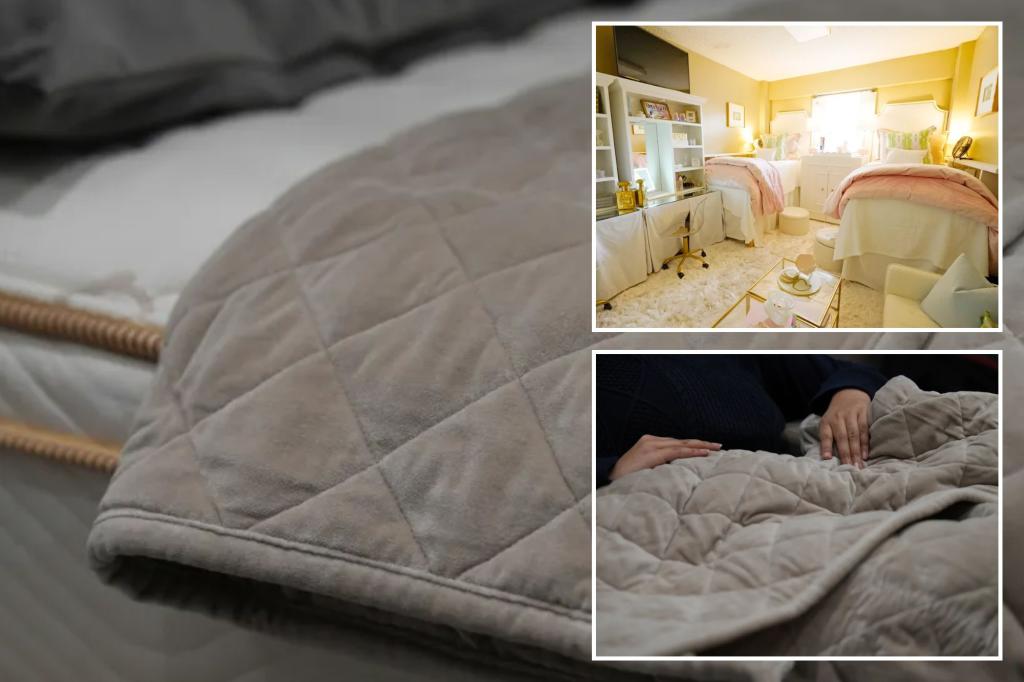Weighted blankets, filled with materials like glass beads, pellets, or cotton, have gained popularity as a comforting aid for sleep and relaxation. The concept behind their purported effectiveness lies in the gentle pressure they exert on the body, mimicking the sensation of a hug or being held. This pressure is believed to activate the parasympathetic nervous system, calming the body’s fight-or-flight response and promoting a sense of security and relaxation. Additionally, the deep pressure touch stimulation may trigger the release of oxytocin, a hormone associated with bonding and stress reduction, further enhancing the calming effect. While anecdotal evidence and personal testimonials abound, scientific research on the effectiveness of weighted blankets remains limited, leaving many questions unanswered.
Despite the lack of extensive scientific backing, many individuals report positive experiences with weighted blankets. Users often describe a feeling of being “grounded” or “held,” which can be particularly soothing for those with anxiety or difficulty sleeping. The added weight can help reduce fidgeting and restless movements, promoting a sense of stillness and tranquility conducive to sleep. Individuals like Rhonda James, a banker from Charleston, South Carolina, found immediate relaxation and improved sleep after trying a weighted blanket, describing the sensation as “a really big hug.” Similarly, Lucy Taylor, a freelance writer from Wales, uses her weighted blanket to manage anxiety-induced sleep disturbances, finding that the physical relaxation promotes mental calmness. These anecdotal accounts highlight the potential benefits of weighted blankets for promoting relaxation and improving sleep quality, but they also underscore the need for further research to substantiate these claims.
The limited research available on weighted blankets offers some intriguing insights, although the studies are often small and focus on specific populations rather than the average sleeper. One study involving individuals with insomnia showed that weighted blankets led to improved sleep compared to a lighter blanket. Another study involving children with autism found no significant impact on sleep duration, but both the children and their parents expressed a preference for the weighted blanket over a regular one. A third study focusing on adults with chronic pain revealed that a heavier weighted blanket, while not affecting sleep, provided better pain relief compared to a lighter one. These studies suggest that weighted blankets may hold promise for specific groups, but further research is needed to determine their broader applicability and efficacy for improving sleep in the general population.
While scientific evidence remains inconclusive, sleep experts generally agree that using a weighted blanket is unlikely to cause harm for most healthy adults. The recommended weight for a weighted blanket is typically around 10% of a person’s body weight, so a 150-pound individual might choose a 15-pound blanket. However, weighted blankets are not recommended for babies, toddlers, or individuals with certain medical conditions like sleep apnea, sleep-related disorders, or respiratory problems, as the added weight could impede breathing or movement. It’s crucial to consult with a healthcare professional before using a weighted blanket if you have any underlying health concerns. Furthermore, individual preferences vary, and some people may find weighted blankets too warm for comfortable use, particularly during warmer months. The cost of weighted blankets can also be a factor, ranging from $50 to over $300 depending on size, weight, and material.
Given the limited research and the potential for individual variability in response, the decision to use a weighted blanket ultimately comes down to personal preference and experience. If you’re considering trying a weighted blanket, it’s advisable to start with a lighter weight and gradually increase as needed. Pay attention to how your body responds and adjust accordingly. While anecdotal evidence suggests potential benefits for relaxation, anxiety reduction, and sleep improvement, it’s important to manage expectations and recognize that weighted blankets are not a guaranteed solution for sleep problems. If you’re experiencing chronic sleep difficulties or other health concerns, it’s always best to consult with a qualified healthcare professional for personalized advice and treatment options.
In summary, weighted blankets offer a unique approach to promoting relaxation and potentially improving sleep. The deep pressure touch provided by these blankets is thought to calm the nervous system, reduce anxiety, and create a sense of security. While anecdotal evidence and personal testimonials suggest positive effects, scientific research on weighted blankets is still in its early stages and requires further investigation to confirm their efficacy. For healthy adults interested in exploring this option, choosing a blanket approximately 10% of their body weight and monitoring their individual response is recommended. However, consulting a healthcare professional is essential for individuals with pre-existing health conditions or concerns. While weighted blankets may not be a panacea for all sleep woes, they may provide a comforting and potentially beneficial addition to a sleep routine for some individuals.


